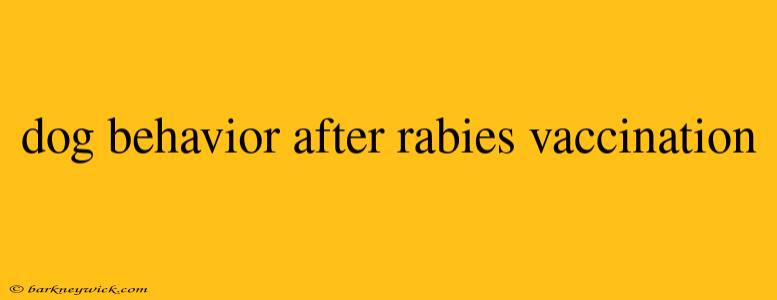Decoding Your Dog's Behavior After Rabies Vaccination: What to Expect and What to Do
A Tail of Two Vaccinations
Remember when Max, my beloved golden retriever, received his first rabies shot? He was a nervous wreck! He whined, paced, and even tried to hide under the couch. I was worried, but the vet assured me it was normal. Later, during his second vaccination, he was calm and relaxed. I realized then that each dog reacts differently to vaccines, and understanding their behavior is crucial.
Is My Dog Acting Strange After the Rabies Vaccine?
It's common for dogs to experience some changes in their behavior after receiving a rabies vaccination. In my opinion, these reactions are mostly temporary and nothing to be overly concerned about.
Here's what you need to know:
Common Reactions and Why They Happen:
- Lethargy: Many dogs become tired and sleepy after the vaccination. This is normal as their body is busy building immunity.
- Loss of Appetite: A temporary decrease in appetite is common. This is likely due to the stress of the vaccination or a mild immune response.
- Mild Fever: A slightly elevated temperature is also a common side effect. This is a sign that the immune system is working hard.
Less Common Reactions:
- Temporary Pain or Swelling at the Injection Site: Some dogs may experience discomfort or swelling at the site of the injection.
- Vomiting or Diarrhea: In some cases, dogs may experience mild gastrointestinal upset.
When to Worry:
While most reactions are mild and temporary, it's crucial to contact your veterinarian immediately if your dog experiences any of the following:
- Severe lethargy or weakness: This could indicate a more serious adverse reaction.
- Excessive drooling or difficulty swallowing: These signs could indicate a reaction affecting the nervous system.
- Seizures: This is a serious medical emergency.
- Difficulty breathing: This could signal a severe allergic reaction.
Important Considerations:
- The Rabies Vaccine and Your Dog: The rabies vaccine is crucial for protecting your dog and the community from this deadly disease. The Centers for Disease Control and Prevention (CDC) emphasizes that "rabies is a serious disease that can be prevented by vaccination."
- The Role of the Vet: Your veterinarian is your most valuable resource. They can help you understand your dog's behavior, address any concerns, and provide proper care.
- Observing Your Dog: Take some time to observe your dog's behavior after the vaccination. Remember: most reactions are mild and short-lived.
Tips to Help Your Dog Feel Better:
- Provide a Quiet and Comfortable Environment: Make sure your dog has a calm and comfortable place to rest.
- Offer Small, Frequent Meals: If your dog isn't eating as much, offer small meals throughout the day.
- Encourage Rest: Avoid overexerting your dog for a few days.
Conclusion:
While it's normal for dogs to exhibit some behavior changes after receiving a rabies vaccine, it's crucial to be aware of the potential side effects and contact your veterinarian if you have any concerns. By understanding the possible reactions and seeking expert advice, you can ensure your furry friend stays safe and healthy. Remember, the rabies vaccine is a vital part of keeping your dog and your community safe.
